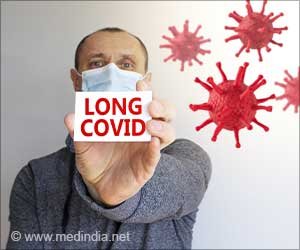Navigating the Long-Term Impact of COVID-19

“While many people’s long COVID-19 symptoms improve slowly over time, this can take years, and some symptoms persist even beyond that point,” said Michael Peluso, an assistant professor of medicine at the University of California, San Francisco. “The disability attributed to these post-COVID-19 conditions is sobering.”
Long COVID-19 has been associated with over 200 symptoms affecting every organ system. Epidemiologist Ziyad Al-Aly and colleagues compared the incidence of 80 post-acute health problems among 138,818 veterans who survived the first month of a COVID-19 infection during the first year of the pandemic to nearly 6 million who were not infected during the same period using the VA’s national databases.
Those who were not hospitalized for COVID-19 had an increased risk of developing 31% of the 80 ailments after two years of follow-up, compared to non-infected controls, whereas those who were hospitalized for COVID-19 had a higher risk of developing 65% of them.
Advertisement
“It’s very clear that people hospitalized during the acute phase of a SARS-CoV-2 infection have a long and arduous road to recovery,” Al-Aly said in an interview. “They have a significantly higher risk of death, even at two years.”
COVID-19’s Long-term Effect on Health and Immunity
The study discovered that the increase in mortality risk from COVID-19 was not substantial after six months for non-hospitalized individuals, but remained considerably increased for those who had been hospitalized for two years. According to the authors, the majority of VA healthcare users are older males, which may limit how applicable the study’s findings are to other populations.
A severe case of COVID-19 may create long-term changes to the innate immune system, the body’s initial line of defense against viruses. The VA study calculated the disease burden in disability-adjusted life years or years lost due to disability.
Long COVID-19 produced a burden of 80.4 disability-adjusted life years for every 1,000 people who caught COVID-19 but were not sick enough to be hospitalized, and 642.8 disability-adjusted life years for every 1,000 patients who were hospitalized for acute illness after two years.
The disability burden “is extremely high, even in the non-hospitalized group, and shows the severity of the impact long COVID-19 is having and will continue to have on society,” according to Hannah Davis, who co-founded the Patient-Led Research Collaborative, which studies long COVID-19, after developing the condition herself in early 2020.
Persistent Symptoms and Health Impact of COVID-19Infection
The VA researchers’ “timely and very important analysis” validates what clinicians have heard from patients in clinic and in smaller studies, according to UCSF’s Peluso, who is also researching COVID-19’s effects. More research on the long-term hazards of COVID-19 is required, according to Peluso.
“It also reinforces the urgency of figuring out exactly what beyond the initial infection causes these post-acute symptoms and sequelae so that we can identify treatments to return people to their regular health sooner and minimize ongoing disability,” he said.
References:
- Davis, H.E., McCorkell, L., Vogel, J.M. et al. Long COVID: major findings, mechanisms and recommendations. Nat Rev Microbiol 21, 133-146 (2023). https:doi.org/10.1038/s41579-022-00846-2
Source: Medindia
Source link
#Navigating #LongTerm #Impact #COVID19



